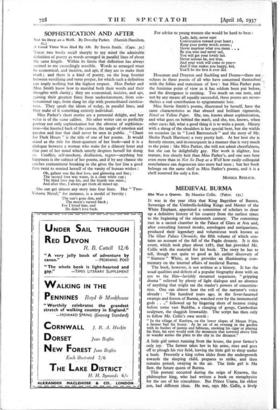SOPHISTICATION AND AFTER
Not So Deep as a Well. By Dorothy Parker. (Hamish Hamilton. 6s.) A Good Time Was Had By All. By Stevie Smith. (Cape. _ss.)
THESE two books recall sharply to my mind the admirable definition of poetry as words arranged in parallel lines of about the same length. Within its limits that definition has always seemed to me exceedingly sensible. Words so arranged must be economical, and incisive, and apt, if they are to make their mark ; and there is a kind of poetry, on the long frontier between versifying and verse proper, for which such a definition can imply nothing but the highest respect. Miss Parker and Miss Smith know how to marshal both their words and their thoughts with clarity ; they are economical, incisive, and apt, ;aining their greatest force from understatement, from con- versational tags, from slang let slip with premeditated careless- ness. They speak the idiom of today, in parallel lines, and they make of it something entirely individual.
Miss Parker's short stories are a perennial delight, and her verse is of the same calibre. No other writer can so perfectly portray not only sophistication but the obverse of sophistica- tion—the knotted back of the canvas, the tangle of emotion and passion and fear that shall never be seen in public. " Chant 1Or Dark Hours " is the title of one of her poems. It would stand as the title for three-quarters of her book—and it is a dialogue between a woman who waits for a dilatory lover and
that part of her mind which utterly despises herself for doing Conflict, self-mockery, disillusion, regret—anything but happiness is the subject of her poems, and if by any chance she
catches contentment breaking in she gives the last line a good firm twist to remind herself of the vanity of human wishes : Oh, gallant was the first love, and glittering and fine ; The second love was water, in a clear white cup ; The third love was his, and the fourth was mine ; And after that, I always get them all mixed up.
She can get almost any story into four lines. Her " Two- Volume Novel," for instance, is a model of brevity :
The sun's gone dim, and The moon's turned black ; For I loved him, and He didn't love back. For advice to young women she would be hard to beat : Lady, lady, never start Conversation toward your heart ; Keep your pretty words serene ; Never murmur what you mean . . Be you wise and never sad, You will get your lovely lad. Never serious be, nor true,
And your wish will come to you— And if that makes you happy, kid,
You'll be the first it ever did.
Housman and Drayton and Suckling and Donne—there are echoes in these poems of all who have concerned themselves with the follies and transience of love : but Miss Parker puts the feminine point of view as it has seldom been put before, and the divergence is exciting. Too much on one note, and not by any means all equally successful, these poems are never- theless a real contribution to epigrammatic lore.
Miss Stevie Smith's poems, illustrated by herself, have the same characteristics as that absurd and brilliant rigmarole, Novel on Yellow Paper. She, too, knows about sophistication, and what goes on behind the mask, and she, too, knows, when other cures fail, what a good thing it is to write a poem. Misery with a shrug of the shoulders is her special bent, but she wields on occasion (as in " Lord Barrenstock " and the story of Mr.
Sholto Peach Harrison) a very pretty lash. At her best she is fiercely sincere, and inconsequent in a manner that is very much to the point : like Miss Parker, she will not admit cheerfulness, but she can be delightfully gay. Her work is slighter, less mature, less closely knit than Miss Parker's, and one sees here even more than in Not So Deep as a Well how easily colloquial nonchalance can degenerate into mere bad taste ; but her book belongs on the same shelf as Miss Parker's poems, and it is a shelf reserved for only a few.
MONICA REDLICH.






















































 Previous page
Previous page